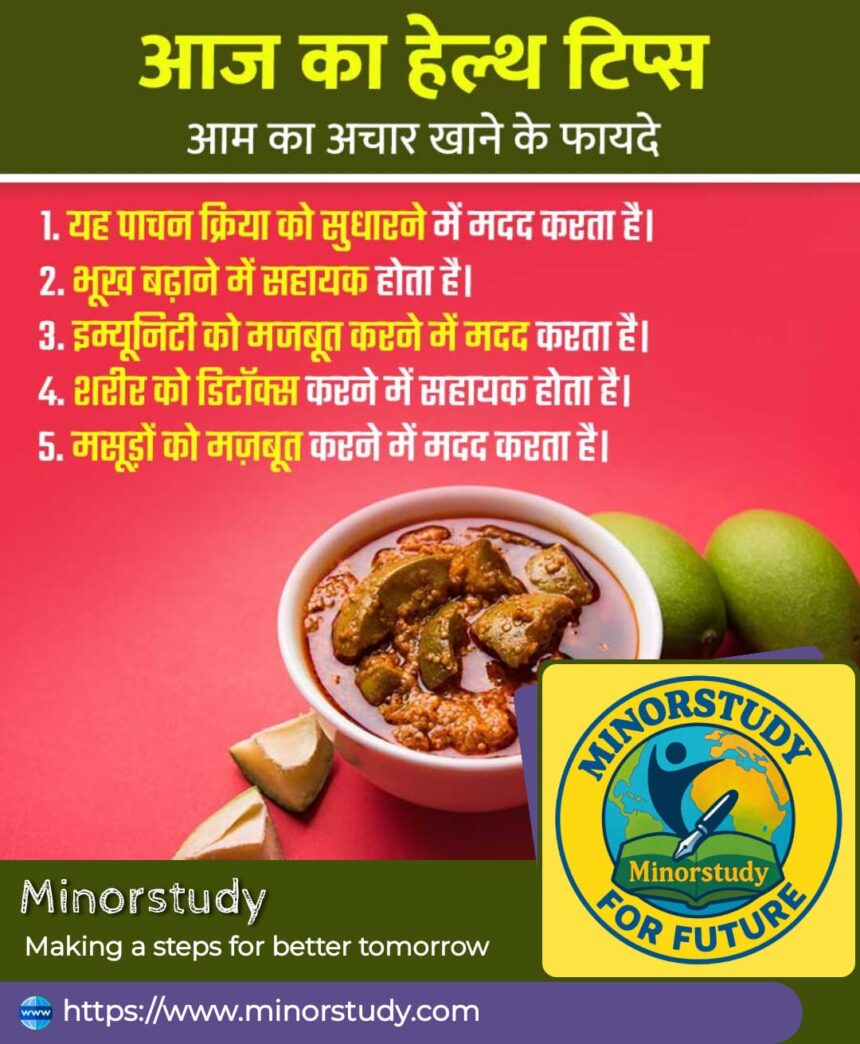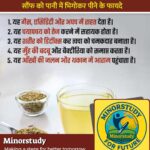🥭 Introduction: More Than Just a Tangy Treat
Mango pickle — or aam ka achaar as it’s lovingly called in India — is more than just a condiment on our plates. It’s a burst of nostalgia, tradition, and taste packed into a single bite. From spicy to tangy, sweet to sour, mango pickle is a cultural treasure, enjoyed across generations.
- 🥭 Introduction: More Than Just a Tangy Treat
- 📜 History of Mango Pickle
- 🗓️ Timeline of Mango Pickle’s Journey
- 🌟 7 Irresistible Health Benefits of Eating Mango Pickle
- 1. 🦠 Boosts Gut Health with Natural Probiotics
- 2. 🧂 Aids in Digestive Enzyme Secretion
- 3. 🩺 Rich in Antioxidants
- 4. 🔥 Natural Appetite Booster
- 5. 🧂 Provides Electrolyte Balance in Summers
- 6. 🧘♀️ Acts as a Mood Enhancer
- 7. 💪 Strengthens Immunity with Medicinal Spices
- 📌 Important Facts and Cultural Observances
- ❓ FAQs on Eating Mango Pickle
- Q1. Is mango pickle healthy for daily consumption?
- Q2. Does it help digestion?
- Q3. Can diabetic or hypertensive patients eat it?
- Q4. Can children eat mango pickle?
- Q5. Is store-bought pickle as beneficial as homemade?
- 🎯 Significance in Our Life and Society
- 🪔 Traditional Rituals and Observance
- 📝 Important Points to Remember
- 🙏 Wishing You a Flavorful and Healthy Journey!
- ✅ Conclusion: A Tangy Superfood Rooted in Tradition
But beyond the flavor, do you know this fiery delicacy also offers a range of health benefits? Surprised? Let’s explore the 7 powerful benefits of eating mango pickle and why it’s not just a treat for your tongue, but also for your tummy, mood, and overall health.
📜 History of Mango Pickle
Mango pickling dates back to ancient India, where preserving food with salt, oil, and spices was both a necessity and an art.
Ancient Ayurvedic texts mention pickles as digestive enhancers.
Tamil and Telugu literature from 500 BCE refer to pickled mangoes (oorugai).
During the Mughal era, mango pickles were flavored with saffron and dry fruits.
British colonizers took the concept abroad — giving rise to chutneys and “mango relish.”
Mango pickle became a cross-cultural phenomenon, celebrated in kitchens from South Asia to the Caribbean.
🗓️ Timeline of Mango Pickle’s Journey
| Period / Century | Milestone |
|---|---|
| 3000 BCE | Salt-based preservation in Indus Valley Civilization |
| 500 BCE | Mango pickling mentioned in Sangam literature |
| 1200–1600 CE | Royal Mughal pickles prepared with saffron and spices |
| 1800s | British fusion pickles spread across colonial territories |
| 1900s–Present | Homemade and commercial mango pickles become kitchen staples |
🌟 7 Irresistible Health Benefits of Eating Mango Pickle
1. 🦠 Boosts Gut Health with Natural Probiotics
Traditional mango pickle is fermented, making it a natural probiotic source that helps balance your gut flora, improves digestion, and supports immunity.
✅ Result: A happier stomach and smoother digestion!
2. 🧂 Aids in Digestive Enzyme Secretion
Pickle spices like asafoetida (hing), fenugreek, mustard, and garlic stimulate digestive juices and enzyme production.
✅ Benefit: Reduces acidity, flatulence, and bloating.
3. 🩺 Rich in Antioxidants
Raw mangoes are loaded with Vitamin C, beta-carotene, and polyphenols, which combat free radicals and reduce inflammation.
✅ Result: Slows aging, boosts immunity, and improves skin health.
4. 🔥 Natural Appetite Booster
That tangy-spicy burst wakes up your taste buds and stimulates hunger, especially helpful for picky eaters and those recovering from illness.
✅ Benefit: Better food intake and nutrition absorption.
5. 🧂 Provides Electrolyte Balance in Summers
Mango pickle contains salt, lemon, and spices, which help replenish electrolytes and prevent dehydration during scorching summers.
✅ Result: Ideal sidekick for summer meals or outdoor workers.
6. 🧘♀️ Acts as a Mood Enhancer
The aroma and taste stimulate dopamine release, leading to temporary joy, relaxation, and satisfaction.
✅ Benefit: A comfort food with actual mood-lifting properties.
7. 💪 Strengthens Immunity with Medicinal Spices
Every spoon of mango pickle contains anti-inflammatory, antifungal, and antibacterial spices like turmeric, mustard, and garlic.
✅ Result: A flavorful way to protect your body from infections.
📌 Important Facts and Cultural Observances
In South India, a special mango pickle called “Avakaya” is prepared during summer and served all year.
Many families pass pickle recipes across generations as part of dowry or wedding rituals.
It’s common to see community pickle-making events, especially in rural India.
Some Indian households prepare 40+ jars of pickle in May–June, enough for an entire year!
❓ FAQs on Eating Mango Pickle
Q1. Is mango pickle healthy for daily consumption?
In moderation, yes! Just avoid over-consumption due to salt and oil.
Q2. Does it help digestion?
Absolutely. Spices in pickle promote enzyme release and digestive balance.
Q3. Can diabetic or hypertensive patients eat it?
Only in limited amounts, due to high sodium and sugar in some variants. Prefer homemade with less salt/oil.
Q4. Can children eat mango pickle?
Yes, in small portions. Avoid extremely spicy versions.
Q5. Is store-bought pickle as beneficial as homemade?
Homemade pickle is usually healthier, as it avoids artificial preservatives and excessive oils.
🎯 Significance in Our Life and Society
In Daily Life:
Makes bland food tasty
Stimulates appetite during illness
Offers a sense of cultural belonging
Easy, long-lasting side dish
In Society:
Promotes local agriculture (mangoes, mustard, spices)
Encourages family bonding through traditional preparations
A form of culinary heritage preservation
Boosts local businesses and home enterprises
🪔 Traditional Rituals and Observance
Gudi Padwa (Maharashtra): New mango pickles are made as a fresh start.
Ugadi (South India): Ugadi Pachadi contains mango pieces and is considered holy.
In Punjab and Haryana, mango pickle is served in weddings with parathas.
Muslim families prepare special mango pickles for Eid feasts.
📝 Important Points to Remember
Use raw, unripe mangoes for the best medicinal value.
Choose pickles preserved in mustard oil or sesame oil.
Store in sunlight for at least 2–3 days for proper fermentation.
Always use a clean, dry spoon to avoid spoilage.
🙏 Wishing You a Flavorful and Healthy Journey!
“May your meals be tangy, your health be strong, and your soul be satisfied — with every bite of traditional mango pickle!”
This is more than a flavor enhancer — it’s ancestral wisdom in a jar, with benefits for the body, mind, and culture. Whether you love it with dal-chawal or paratha, mango pickle isn’t just a condiment — it’s a celebration of life.
✅ Conclusion: A Tangy Superfood Rooted in Tradition
Modern science is finally catching up with what grandmothers knew all along — eating mango pickle in moderation is good for you. It’s packed with probiotics, digestive aids, antioxidants, and cultural meaning.
So next time you see that vibrant jar on your dining table, don’t just scoop it — celebrate it. Because every spoonful is a perfect blend of taste, tradition, and well-being.
✔️ Tangy ✔️ Traditional ✔️ Therapeutic — That’s mango pickle for you!








